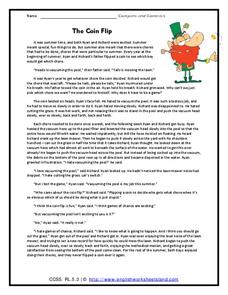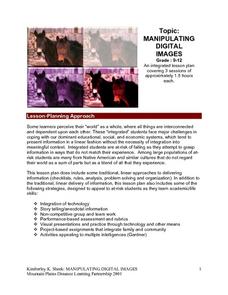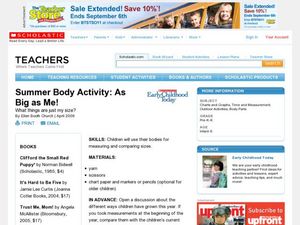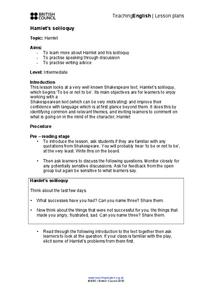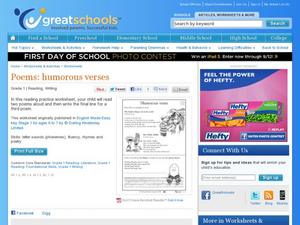Achieve3000
Figurative Language
Similes and metaphors make writing more beautiful and detailed, but can be a little harder to decipher during a first reading. Use a passage from The Man Who Loved Words to show young readers how to think through passages that contain...
Council for the Curriculum, Examinations and Assessment
Morals, Values, and Beliefs
What is integrity? What are the barriers that could keep a person from acting with integrity? How might these barriers be overcome? Class members tackle these questions as part of a course on Social, Physical, Emotional, Cognitive and...
English Worksheets Land
The Coin Flip
Work on reading comprehension skills with a passage about doing chores. Learners read about two boys who vacuum the pool and mow the lawn, then complete a learning exercise about the details in the story.
Code.org
Sending Numbers
Binary graphing ... bit by bit. Pairs work together to develop a protocol in order to send the points of a graph. One partner sends the points and the other receives them and tries to recreate the graph. The pupils use the rubric to...
Turabian Teacher Collaborative
Introductions: Formulating Problem Statements
Describing a problem efficiently doesn't solve it, but a well-crafted argument can move readers to action. High schoolers focus on structuring problem statements by reading examples of strong essays and working in groups to create their...
Roy Rosenzweig Center for History and New Media
Labor Unions in an Industrializing U.S.
Have class members eager to enter the workforce? They'll be glad to learn that things aren't how they used to be. Have your young historians examine then discuss four primary source images related to the negative effects of...
DiscoverE
Design a Catapult
Just this once, it's okay to throw things in class. Out of craft sticks and rubber bands, pupils build catapults to launch an object of choice. This can be a ping-pong ball, a marshmallow, or any other small item. As long as it hits the...
EngageNY
Introducing “Comprehending the Calamity”
Some things are beyond comprehension. Scholars read an excerpt from "Comprehending the Calamity," a primary source text about the 1906 San Francisco earthquake. After identifying the gist, pupils complete anchor charts to analyze how the...
Utah Education Network (UEN)
7th Grade Poetry: Sonnet Poem
Two sonnets provide seventh graders with examples of Shakespearean sonnets. After discussing the story of the poems and analyzing their rhyme scheme and rhythm, young poets craft a Shakespearian sonnet and share their work with two...
Curated OER
The Carbon Cycle
Here is an interesting science lesson. Pupils discover that carbon, just like water, is absolutely necessary for all living things to survive. They study how it cycles through nature, become familiar with the periodic table, and look at...
Curated OER
Manipulating Digital Images
High schoolers work with pre-loaded images as well as with a digital camera to manipulate digital images. At the end of the lesson, they analyze and write about their work using complete sentences, correct grammar, and spelling. For a...
Curated OER
Summer Body Activity: As Big as Me!
Learners explore things that are their size, literally. In this early childhood lesson plan, students use their bodies for measuring and comparing sizes as they work in pairs to complete the activity.
Curated OER
Hamlet's Soliloquy
Everyone is familiar with the beginning of Hamlet's soliloquy, "To be or not to be..." While reading Hamlet, help your middle schoolers analyze the lines that follow, but how do you help them make personal connections to the text? Use...
Curated OER
Bucket List Poetry
What is on your pupils' "Bucket Lists" - the list of things they want to do before they die? Their choices of activities for this list could be very revealing, and is a great source of inspiration for a personal poem. The lesson prompts...
Curated OER
What is a Verb?
Verbs are the most exciting words because they describe action. Kids can get excited about verbs too! Once they are provided with a solid description of what they are, how they are used, and what they look like in sentences, verbs will...
Curated OER
Poems: Humourous Verses
First grade is a great time to build strong reading skills. Here are three short rhyming poems or common nursery rhymes that are intended to help boost reading fluency. Because most children know these rhymes, they will have an easier...
Curated OER
Real-Life Problems
Money math comes up in real life all the time, so be sure scholars are ready for the challenge with these word problems. They use multiple math operations to solve and show work for each one. There is an example to get them started...
Curated OER
House and Holmes: A Guide to Deductive and Inductive Reasoning
Test your pupils' reasoning skills with several activities and a quick mystery to solve. Learners watch and analyze a few video clips that demonstrate reasoning in action, practice deduction with an interactive and collaborative...
Pearson
Past Time
How do you talk about things that have already happened? What about things that happened in the past and are still happening? Explore past, past perfect, and past progressive verb tenses in a helpful slideshow presentation.
Environment Agency - Abu Dhabi
Sedimentation
Starting with a presentation, pupils learn about how sedimentary rocks form. They then create their own sedimentation bottle to observe the process.
NOAA
Exploring Potential Human Impacts
Arctic sea ice reflects 80 percent of sunlight, striking it back into space; with sea ice melting, the world's oceans become warmer, which furthers global warming. These activities explore how humans are impacting ecosystems around the...
K5 Learning
Will the Wolf
How well can a wolf survive without a pack? Third graders read about headstrong Will and his desire to be an independent wolf with a short story and series of comprehension questions.
Science Matters
Plot Study
Small groups investigate plots of land to discover how abiotic and biotic factors interact. After recording their findings, scholars share observations with peers and self-reflect on the learning process.
Curated OER
Prince Albert, Saskatchewan, 1903: Photos of a Community
Students looks at a series of photographs taken in 1903 in the community of Prince Albert, Saskatchewan. They examine how needs were satisfied in this community, and compare that to how the same needs are satisfied in their own community.
Other popular searches
- How Things Work Lenses
- How Things Work Toaster
- Explaining How Things Work
- How Things Work" Odometer
- Explanation How Do Things Work
- How Things Work Odometer
- "How Things Work" Odometer




